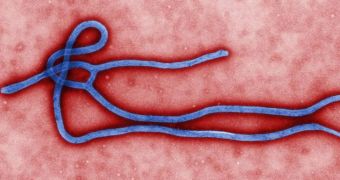The mechanism that the Ebola virus employs in order to disable the immune system and to successfully set up camp in the body of the people it comes to infect is described in a paper published in yesterday's issue of the journal Cell Host & Microbe.
This study was published just as West Africa is battling what the World Health Organization not too long ago labeled the worst Ebola Virus Disease outbreak ever recorded in history.
Writing in the journal Cell Host & Microbe, scientists explain that, over the years, the human body has evolved to produce and release signaling proteins dubbed interferons when faced with a viral infection.
As shown by previous investigations, these signaling proteins serve to put the body's natural defense mechanisms into overdrive, and boost the immune system response to whatever virus is present in the organism.
The Ebola virus might not have graduated from an elite med school, but it appears to be all too familiar with how these proteins work. Hence the fact that, when in the body, it immediately takes action to block interferon-based signals.
The result is that the immune system fails to engage and destroy the virus in the very early stages of infection. Consequently, the Ebola virus is free to run amuck and infect as many cells as its teeny tiny heart desires, ultimately causing death.
According to scientists with the Mount Sinai Medical Center and their colleagues, the Ebola virus manages to keep interferons from passing their signals to other cells by releasing a protein dubbed the Ebola Viral Protein 24 (eVP24). It is this protein that keeps the immune system from reacting.
More precisely, eVP24 is said to attach itself to transport proteins that are supposed to carry interferon-based signals into cells. The result is that the signals never get sent, and the virus gets to spread without having to worry about being attacked by the immune system.
Now that researchers know how the Ebola virus disables the immune system, it is to be expected that future investigations will focus on developing compounds able to switch off the production of the Ebola Viral Protein 24 and thus keep the virus from sticking to its routine.
“Our study is the first to show how Ebola viral protein 24 defeats the signal sent by interferons, the key signaling molecules in the body’s early response to Ebola virus infection. These newfound details of Ebola biology are already serving as the foundation of a new drug development effort, albeit in its earliest stages,” said Dr. Christopher F. Basler.

 14 DAY TRIAL //
14 DAY TRIAL //